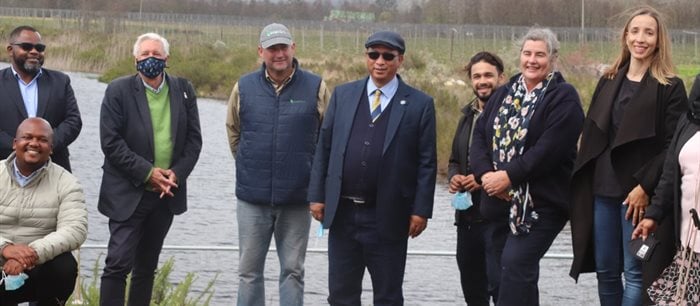For the past decade, South African Breweries (SAB) has partnered with the World Wide Fund for Nature South Africa in implementing a seven-step process to address water security in the Western Cape area of George, South Africa.

Leon van Wyk, George municipality mayor, Western Cape provincial minister of agriculture, Ivan Meyer and representatives from both the South African Breweries and the World Wide Fund for Nature South Africa visited the site of the project to observe its progress. | Source: Supplied
On Thursday, 30 September 2021, George mayor Leon van Wyk and Western Cape provincial minister of agriculture Ivan Meyer visited the site of the George Ecosystem Restoration for Watershed Health and Replenishment initiative to observe the progress of the project.
The area of George is currently the only region in Africa that is suitable for growing hops - a vital ingredient in the water-intensive process of brewing beer. The effects of climate change, including changing rainfall patterns as well as fluctuating and rising temperatures, are putting increased pressure on water availability in the George region.
The seven-step George Ecosystem Restoration for Watershed Health and Replenishment initiative focuses on convening stakeholders, identifying specific local water challenges and potential solutions, implementing agreed solutions with governance and financing mechanisms in place, communicating progress and measuring impact.
Among the project highlights are:
- Water saved: Estimated to be around 9 billion litres per year, based on total clearing of invasive alien vegetation.
- Active restoration: New restoration techniques piloted on 20 hectares of riparian land, proving that the local fynbos naturally restores itself when enabled to do so.
- Community impact: An estimated 36,000 person-days of employment created.
A multi-faceted solution for a multi-faceted problem
In addition to the threat that climate change poses on the water supply in George, the presence of non-native vegetation in the Waboomskraal and Herold catchments represents a major challenge to water security in the region.
Several options were considered to improve water availability in the local context such as shifting on-farm water use practices and improving infrastructure by fixing leaks and desilting dams. The initiative focused its efforts on the removal of invasive non-native vegetation because of the significant potential benefit to businesses, local communities and ecosystems.
Josh Hammann, director at SAB Agri Development explains: “We know there is no single, one-size-fits all solution to building water resilience and security. Our solution is multi-faceted because the problem is multi-faceted.
There is a significant social imperative that we aim to tackle with our watershed management process and this includes job creation for the surrounding communities. In addition to implementing green infrastructure, this project has employed, trained and equipped local people and farmers to protect, conserve and steward their watershed.”
Hammann says SAB is committed to bridging solutions to the growing water challenges across communities and supply chain. “Our goal is that by 2025, 100% of our communities in high-stress areas will have measurably improved water availability and quality,” Josh Hammann said.






















































